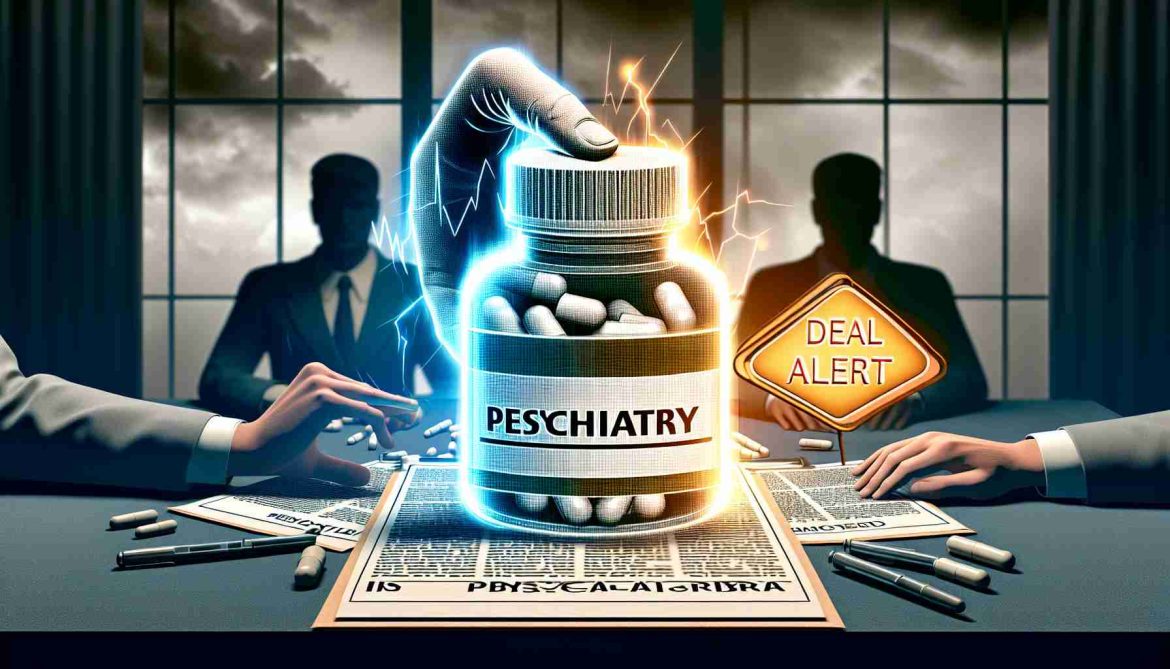Johnson & Johnson’s Bold Acquisition in Neuroscience
In a groundbreaking transaction, Johnson & Johnson (J&J) is set to acquire Intra-Cellular Therapies, granting it rights to Caplyta (lumateperone), the sole FDA-approved medication for bipolar I and II depression, alongside schizophrenia. This acquisition, projected to finalize by 2025, highlights J&J’s strategic focus on transformative care solutions in mental health.
Caplyta’s market prospects are astonishing, with expectations that it could yield over $5 billion in peak annual sales. Additionally, J&J will benefit from potential therapeutics in developmental stages, including ITI-1284 for anxiety disorders and Alzheimer-related psychosis. The company’s commitment to advancing research in neuropsychiatric disorders is further underscored by comments from Joaquin Duato, J&J’s Chief Executive Officer, emphasizing a steadfast legacy in neuroscience.
As J&J strengthens its foothold in the European pharmaceutical sector, contributing approximately $20.44 billion to its global revenue in 2023, questions remain regarding Caplyta’s future marketing prospects in Europe. This acquisition comes as part of a broader strategy to counteract revenue impacts from product patent expirations.
The stock market reflected enthusiasm for the deal, with Intra-Cellular Therapies’ shares skyrocketing by over 35% in pre-market trading. Following the transaction, the company is set to exit the stock exchange. Meanwhile, competitors like Eli Lilly are also making headlines with significant acquisitions in the oncology domain.
Johnson & Johnson’s Strategic Move: What the Intra-Cellular Therapies Acquisition Means for Mental Health Treatment
Johnson & Johnson’s Bold Acquisition in Neuroscience
Johnson & Johnson (J&J) has made waves in the pharmaceutical industry with its recent agreement to acquire Intra-Cellular Therapies, which will secure its rights to Caplyta (lumateperone), the only FDA-approved treatment for bipolar I and II depression, as well as schizophrenia. This bold acquisition, anticipated to close by 2025, is part of J&J’s ongoing commitment to innovation in mental health care.
# Caplyta’s Market Potential
The potential market impact of Caplyta is significant. Analysts predict that annual sales could surpass $5 billion at peak performance. Given the growing global emphasis on mental health, Caplyta could play a crucial role in J&J’s portfolio. Furthermore, the acquisition includes pipeline candidates such as ITI-1284, which targets anxiety disorders and Alzheimer-related psychosis, expanding J&J’s therapeutic reach significantly.
# Financial Implications and Future Planning
From a financial standpoint, this acquisition aligns with J&J’s efforts to mitigate revenue losses due to expiring product patents. With the European pharmaceutical market contributing around $20.44 billion to J&J’s total revenue in 2023, the integration of Caplyta could bolster the company’s financial health in a competitive landscape. However, questions remain about Caplyta’s future marketing strategies and regulatory challenges within Europe.
# Impact on Stock Market and Competitive Landscape
The initial market reaction to the acquisition has been overwhelmingly positive, as evidenced by a more than 35% surge in Intra-Cellular Therapies’ stock value in pre-market trading. This reflects investors’ confidence in J&J’s ability to leverage its acquisition effectively. Notably, as J&J expands its focus in the mental health domain, other pharmaceutical giants, such as Eli Lilly, are similarly pursuing acquisitions, particularly in oncology, signaling a trend towards consolidation within the industry.
# Pros and Cons of the Acquisition
Pros:
– Increased Market Share: J&J expands its presence in the mental health market.
– Innovative Product Pipeline: Access to promising therapies for anxiety and Alzheimer’s-related conditions.
– Financial Growth Potential: Estimated peak sales of Caplyta could significantly enhance J&J’s revenues.
Cons:
– Regulatory Challenges: Navigating marketing approvals in Europe may pose hurdles.
– Market Competition: Heightened competition in both the mental health and oncology sectors.
– Shifts in Company Focus: Potential diversion of resources from other strategic initiatives due to the acquisition.
# Insights into Mental Health Trends
The acquisition comes at a time when there is a heightened awareness surrounding mental health issues globally. With rising demands for effective treatments for psychiatric disorders, J&J’s investment in mental health medications signals a commitment to addressing these critical health concerns. Innovations in neuropsychiatry are being amplified, leading pharmaceutical companies to prioritize research and development in this sector.
# Predictions for the Future
As the mental health landscape evolves, J&J’s strategic acquisition of Intra-Cellular Therapies may pioneer new treatment protocols and drive research efforts. It positions the company to potentially lead in the neuroscience field over the coming years. With ongoing advancements and a more profound understanding of psychiatric conditions, J&J’s expansion into mental health may yield transformative results, not only for the company but for the patients who rely on effective treatments.
For more information on Johnson & Johnson’s initiatives and developments, visit the official site: Johnson & Johnson.



